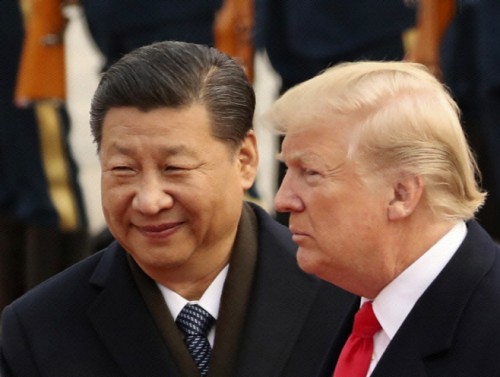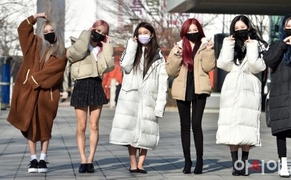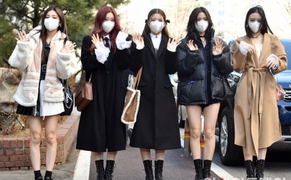 |
| U.S. President Donald Trump (right) and Chinese President Xi Jinping converse at the Great Hall of the People in Beijing, China, on November 7, 2017./ Source: AP-Yonhap |
U.S. President Donald Trump has announced a 125% tariff hike on Chinese imports in response to China’s retaliatory measures, while simultaneously granting a 90-day suspension of reciprocal tariffs on countries and regions that have not taken retaliatory actions against the U.S.
On April 9, Trump wrote on his social media platform Truth Social, “The United States is immediately raising tariffs on China to 125%.”
He cited China's "lack of respect that China has shown to the world’s markets" as the reason behind the decision. Earlier that day, Beijing had responded to Washington's 104% tariff on Chinese goods by increasing its own tariffs on U.S. imports from 34% to 84%—a move Trump interpreted as disrespectful.
“At some point, hopefully in the near future, China will realize that the days of ripping off the U.S.A., and other Countries, is no longer sustainable or acceptable,” Trump stated.
In contrast, Trump pointed out that “over 75 countries” have contacted U.S. officials—including representatives from the Department of Commerce, the Department of the Treasury, and the U.S. Trade Representative (USTR)—to negotiate solutions regarding trade, tariffs, trade barriers, currency manipulation, and non-tariff barriers, and none of them retaliated in any form. Based on this, he said, “I have authorized a 90 day PAUSE, and a substantially lowered reciprocal tariff during this period, of 10%, also effective immediately."
U.S. Treasury Secretary Scott Bessent told reporters at the White House that “solutions for each country will be customized, which takes time,” and that Trump personally wants to be involved in the negotiations, hence the 90-day pause.
When asked whether the decision to suspend tariffs was prompted by recent stock market drops, Bessent replied, “No. It was because many countries reached out—more than 75 of them.”
Earlier that day, during an American Bankers Association event in Washington, D.C., Bessent had said the U.S. would respond to China in coordination with allies like South Korea and Japan after reaching bilateral agreements with them.
He mentioned that Trump had held phone calls with Japanese Prime Minister Shigeru Ishiba and South Korean Acting Prime Minister Han Duck-soo, and that U.S. officials would meet with a Vietnamese delegation later in the day. “I believe we’ll ultimately reach agreements with allies and other countries,” he added.
Bessent continued, “They have been strong military allies, but not perfect economic allies. After that, we can jointly confront China.”
He also emphasized that the reciprocal tariffs Trump announced on April 2 were conditional—intended as an upper limit if countries did not retaliate. But since China did retaliate, the U.S. would now escalate.
“Regrettably, in terms of escalation, the biggest violator in the global trade system is China,” Bessent said. “And it’s the only country that has chosen to escalate.”
Quoting a senior Spanish official who recently said Europe should cooperate more closely with China, Bessent warned, “That’s like cutting off your own head.”
In a separate interview with Fox Business, Bessent noted that several countries surrounding China—such as Japan, South Korea, India, and Vietnam—are choosing to negotiate rather than retaliate. “Everyone is coming to the negotiation table, and China is basically surrounded,” he said.
He stressed that China, by escalating the trade dispute through tit-for-tat tariffs, stood to lose the most: “China exports five times more to the U.S. than we export to them.”
Most Read
-
1
-
2
-
3
-
4
-
5
-
6
-
7





















